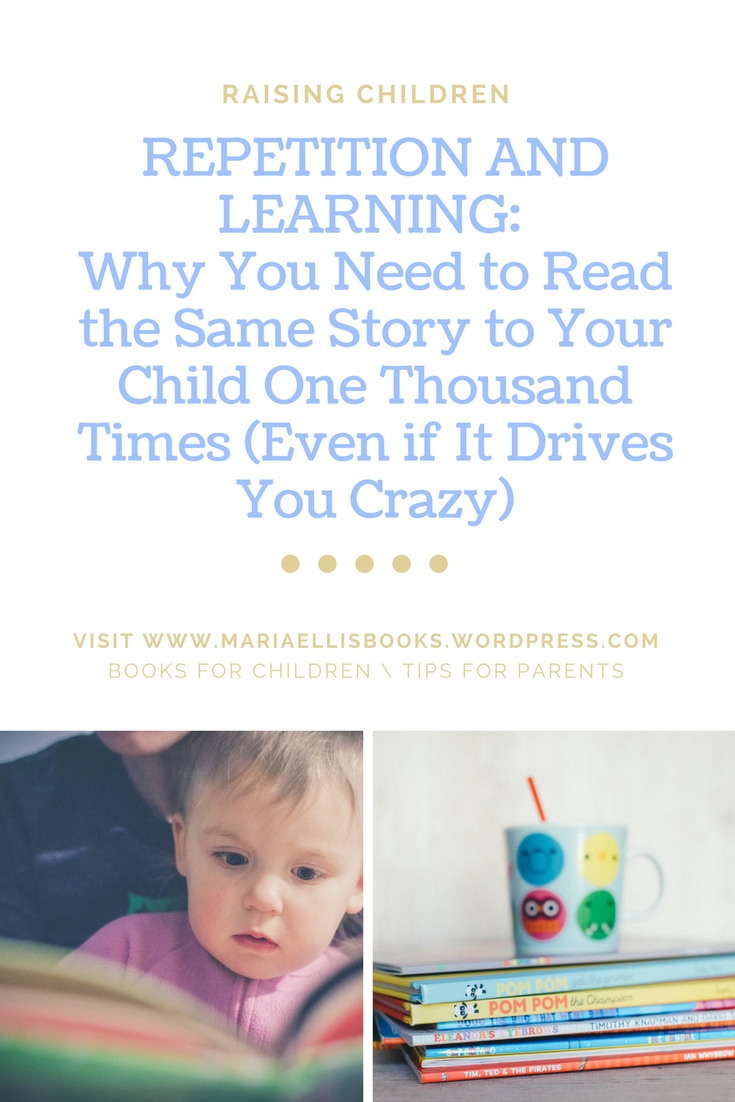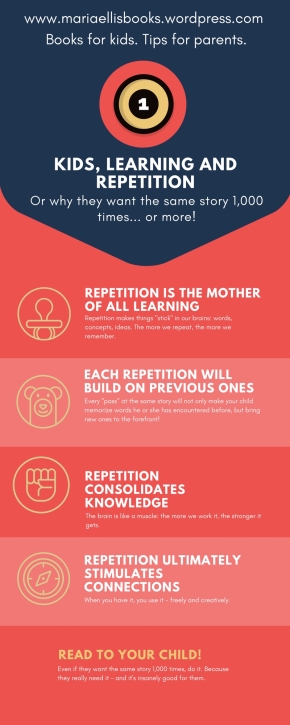 Very early in his life, probably in his first month already, my son began showing preferences for certain stories, books and songs.
Very early in his life, probably in his first month already, my son began showing preferences for certain stories, books and songs.
He fussed and even cried during some and listened very attentively during others.
After about three months, he started to have DEFINITE preferences. He would very clearly let me know (mostly by fussing or crying, but much more vehemently!) which songs and stories he wanted.
As he reached various developmental milestones and his cognitive and language skills evolved, he began focusing on one or two stories at a time, which he wanted over and over and over again.
How long did a song or a story “last”? Well… weeks or even months, really.
We would read the same book over and over and over and over and over and over… again.
He is three and a half now and that still has not changed.
It drives my husband a little crazy. Well, at least it used to…
The thing is, this repetition that they crave so much is something that they actually need – and is super good for them!
Here is why:
1. Repetition is the mother of all learning.
This saying is very old. It is so old that nobody can tell who came up with it first. It is as old as homo sapiens, I suspect.
In languages learning, the theory says that someone needs to hear a word seven (7!) times before they actually remember it.
If you are interested in the biology of learning and how your brain actually accomplishes that, there are many interesting resources online.
I found a fascinating article on www.biologywriter.com about this very subject, from which I will quote only this:
“… learning is a molecular conversation that takes place between nerve cells in the brain.”
The more we “converse” on the same brain pathways, the stronger they become.
Now, can you even fathom the amount of repetition is needed when a child is learning… EVERYTHING?!
So don’t hold it against them! Read the same story as much as they need it!
2. Each repetition will build on previous acquisitions
In early childhood education they say a child “acquires” skills – and everything is a skill: from learning to talk, to going potty, to social interactions to cleaning his or her room…
When you read a new story to your child, the first and obvious acquisitions your child will make will be in the language department.
He or she will instantly begin enriching their vocabulary.
However, a story has tens, or dozens or hundreds of words. Obviously, they cannot all become a part of a child’s vocabulary immediately.
Your kid will make a selection of words that appeal to him or her and will start memorizing those first.
By the way, this is not a logical process – or even conscious! They are simply more attracted to certain things – and I don’t think anybody can explain why: genetics, natural inclination, temperament…
So back to those first words that pop out of a new story… the memorization process will begin.
But it will take a while!
Remember those 7 times a person needs a new word repeated to them before they will call it their own?
Some words will “stick” faster than others too!
With every pass, every time you read the same story, your child will imprint those words into his or her brain – and then start adding more!
Out of the dozens or hundreds of words that a story is made of, many of those will make their way into your child’s word bank over the course of the weeks and months that he or she is asking you to read it.
You see how much work there is to be done? No wonder they want to read the same thing again and again and again!
And there is more!
They learn not only words – but concepts and things about the world!
Yes, they name colors and animals and shapes, but they also begin to get an idea about joy and sadness, fear and curiosity, exploration and adventure and more abstract things.
3. After consolidating new knowledge, your child will begin making connections
There is a reason why all through our school careers we are forced to revise again and again: it is the same idea of repetition at work.
In teachers’ language, there is such a thing as “consolidating” the knowledge.
You may feel confident in having learned a new skill – but give it a break of a couple of weeks and try it again! How about a couple of months? How about a couple of years?
The more we repeat something, the “deeper” it goes. This is why we never forget certain things – like riding a bicycle or, more punctual to the subject of this article, the words of a childhood song.
Repetition consolidates knowledge.
But there is an extra step after that – one which opens whole worlds and entire universes: CONNECTIONS.
When a child’s brain can juggle new words and concepts, it will naturally start making connections between them.
Sometimes, when they are very young, they get them all mixed up.
This is why “The Gruffalo” can appear in a story about a bear in the “We’re Going on a Bear Hunt” story.
If you know those two books, you can see the similarity between the Gruffalo and the bear – and the fact that the main characters are going on a journey.
When my son actively began making connections, he used to say “This is LIKE that!” with great delight. A truck is LIKE a car. A robot is LIKE a man.
Sometimes it is astonishing how far their minds can go – way beyond those of adults, who are more rigid by years and years of “Things should be like THIS, not like THAT!” (orange kangaroos, anyone?)

To recap, children need repetition because:
- repetition fosters learning
- repetition will build on knowledge already acquired
- repetition consolidates knowledge and stimulates connections
It is really, really, really, really, really, really, really…………….really good for them.
So read them that story for a year if they want to. Because they really need it!
Maria
PS: This article is about books, but the same thing can be applied to movies or any other form of learning.
PPS: And yes, I said movies because when we watch a film (usually animated), my son is learning a ton of words and expressions and is making an insane amount of connections – and I’m helping out by “telling” the movie, which he loves by the way. Then, he repeats it back to me, which he loves too. Then he tells me the story in his own words… But all this is the subject of another article.